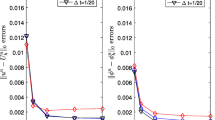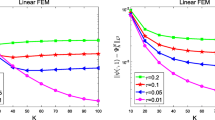Abstract
This paper is concerned with unconditionally optimal error estimates of linearized leap-frog Galerkin finite element methods (FEMs) to numerically solve the d-dimensional \((d=2,3)\) nonlinear Klein–Gordon–Schrödinger (KGS) equation. The proposed FEMs not only conserve the mass and energy in the given discrete norm but also are efficient in implementation because only two linear systems need to be solved at each time step. Meanwhile, an optimal error estimate for the proposed methods is derived by using the temporal-spatial error splitting techniques, which split the error between the exact solution and the numerical solution into two parts, i.e., the temporal error and the spatial error. Since the spatial error is \(\tau \)-independent, the boundedness of the numerical solution in \(L^\infty \)-norm follows an inverse inequality immediately without any restriction on the grid ratios. Then, the optimal \(L^2\) error estimates for r-order FEMs are derived unconditionally. Numerical results in both two and three dimensional spaces are given to confirm the theoretical predictions and demonstrate the efficiency of the methods.






Similar content being viewed by others
References
Adams, R.A., Fournier, J.J.: Sobolev Spaces. Academic Press, New York (2003)
Akrivis, G.D., Dougalis, V.A., Karakashian, O.A.: On fully discrete Galerkin methods of second-order temporal accuracy for the nonlinear Schrödinger equation. Numer. Math. 59, 31–53 (1991)
Antoine, X., Besse, C., Klein, P.: Absorbing boundary conditions for general nonlinear Schrödinger equations. SIAM J. Sci. Comput. 33, 1008–1033 (2011)
Bao, W., Dong, X., Wang, S.: Singular limits of Klein–Gordon–Schrödinger equations. Multiscale Model. Simul. 8, 1742–1769 (2010)
Bao, W., Mauser, N.J., Stimming, H.P.: Effective one particle quantum dynamics of electrons: a numerical study of the Schrödinger–Poisson-X\(\alpha \) model. Commun. Math. Sci. 1, 809–828 (2003)
Bao, W., Yang, L.: Efficient and accurate numerical methods for the Klein–Gordon–Schrödinger equations. J. Comput. Phys. 225, 1863–1893 (2007)
Biler, P.: Attractors for the system of Schrödinger and Klein–Gordon equations with Yukawa coupling. SIAM J. Math. Anal. 21, 1190–1212 (1990)
Bohun, S., Illner, R., Lange, H., Zweifel, P.F.: Error estimates for Galerkin approximations to the periodic Schrödinger–Poisson system. ZAMM Z. Angew. Math. Mech. 76, 7–13 (1996)
Borz, A., Decker, E.: Analysis of a leap-frog pseudospectral scheme for the Schrödinger equation. J. Comput. Appl. Math. 193, 65–88 (2006)
Brenner, S., Scott, L.R.: The Mathematical Theory of Finite Element Methods. Springer, Berlin (1994)
Cai, W., He, D., Pan, K.: A linearized energy-conservative finite element method for the nonlinear Schrödinger equation with wave operator. Appl. Numer. Math. 140, 183–198 (2019)
Castillo, P., Gómez, S.: Conservative local discontinuous Galerkin method for the fractional Klein–Gordon-Schrödinger system with generalized Yukawa interaction. Numer. Algorithms 84, 407–425 (2020)
Dehghan, M., Mohammadi, V.: Two numerical meshless techniques based on radial basis functions (RBFs) and the method of generalized moving least squares (GMLS) for simulation of coupled Klein–Gordon–Schrödinger (KGS) equations. Comput. Math. Appl. 71, 892–921 (2016)
Douglas Jr., J., Ewing, R.E., Wheeler, M.F.: A time-discretization procedure for a mixed finite element approximation of miscible displacement in porous media. RAIRO Anal. Numer. 17, 249–265 (1983)
Ewing, R.E., Wheeler, M.F.: Galerkin methods for miscible displacement problems in porous media. SIAM J. Numer. Anal. 17, 351–365 (1980)
Fukuda, I., Tsutsumi, M.: On coupled Klein–Gordon–Schrödinger equations, I. Bull. Sci. Eng. Lab. Waseda Univ. 69, 51–62 (1975)
Fukuda, I., Tsutsumi, M.: On coupled Klein–Gordon–Schrödinger equations II. J. Math. Anal. Appl. 66, 358–378 (1978)
Gao, H.: Optimal error estimates of a linearized backward Euler FEM for the Landau–Lifshitz equation. SIAM J. Numer. Anal. 52, 2574–2593 (2014)
Gao, H., Li, B., Sun, W.: Optimal error estimates of linearized Crank–Nicolson Galerkin FEMs for the time-dependent Ginzburg–Landau equations in superconductivity. SIAM J. Numer. Anal. 52, 1183–1202 (2014)
Guo, B.: Global solution for some problem of class of equations in interaction of complex Schrödinger field and real Klein–Gordon field. Sci. China Ser. A 2, 97–107 (1982)
Guo, B., Miao, C.: Global existence and asymptotic behavior of solutions for the coupled Klein–Gordon–Schrödinger equations. Sci. China Ser. A 38, 1444–1456 (1995)
Guo, B., Miao, C.: Asymptotic behavior of coupled Klein–Gordon–Schrodinger equations. Sci. China Ser. A 25, 705–714 (1995)
Guo, L., Xu, Y.: Energy conserving local discontinuous Galerkin methods for the nonlinear Schrödinger equation with wave operator. J. Sci. Comput. 65, 622–647 (2015)
Hecht, F.: New development in Freefem++. J. Numer. Math. 20, 251–265 (2012)
Heywood, J.G., Rannacher, R.: Finite element approximation of the nonstationary Navier–Stokes problem. Part IV: error analysis for the second order time discretization. SIAM J. Numer. Anal. 2, 353–384 (1990)
Hioe, F.: Periodic solitary waves for two coupled nonlinear Klein–Gordon and Schrödinger equations. J. Phys. A Math. Gen. 36, 7307–7330 (2003)
Hong, J., Jiang, S., Li, C.: Explicit multi-symplectic methods for Klein–Gordon–Schrödinger equations. J. Comput. Phys. 228, 3517–3532 (2009)
Hong, Q., Wang, Y., Wang, J.: Optimal error estimate of a linear Fourier pseudo-spectral scheme for two dimensional Klein–Gordon–Schrödinger equations. J. Math. Anal. Appl. 468, 817–838 (2018)
Hou, Y., Li, B., Sun, W.: Error estimates of splitting Galerkin methods for heat and sweat transport in textile materials. SIAM J. Numer. Anal. 51, 88–111 (2013)
Li, M., Shi, D., Wang, J., Ming, W.: Unconditional superconvergence analysis of the conservative linearized Galerkin FEMs for nonlinear Klein–Gordon–Schrödinger equation. Appl. Numer. Math. 142, 47–63 (2019)
Li, B., Sun, W.: Error analysis of linearized semi-implicit Galerkin finite element methods for nonlinear parabolic equations. Int. J. Numer. Anal. Mod. 10, 622–633 (2013)
Li, B.: Mathematical modeling, analysis and computation for some complex and nonlinear flow problems. Ph.D. Thesis, City University of Hong Kong, Hong Kong (2012)
Li, B., Gao, H., Sun, W.: Unconditionally optimal error estimates of a Crank–Nicolson Galerkin method for the nonlinear thermistor equations. SIAM J. Numer. Anal. 52, 933–954 (2014)
Li, B., Sun, W.: Unconditional convergence and optimal error estimates of a Galerkin-mixed FEM for incompressible miscible flow in porous media. SIAM J. Numer. Anal. 51, 1959–1977 (2013)
Li, B., Wang, J., Sun, W.: The stability and convergence of fully discrete Galerkin–Galerkin FEMs for porous medium flows. Commun. Comput. Phys. 15, 1141–1158 (2014)
Li, D.: Optimal error estimates of a linearized Crank–Nicolson Galerkin FEM for the Kuramoto–Tsuzuki equations. Commun. Comput. Phys. 26, 838–854 (2019)
Mu, M., Huang, Y.: An alternating Crank–Nicolson method for decoupling the Ginzburg–Landau equations. SIAM J. Numer. Anal. 35, 1740–1761 (1998)
Ohta, M.: Stability of stationary states for the coupled Klein–Gordon–Schrödinger equations. Nonlinear Anal. 27, 455–461 (1996)
Sanz-Serna, J.M.: Methods for the numerical solution of nonlinear Schrödinger equation. Math. Comput. 43, 21–27 (1984)
Tourigny, Y.: Optimal \(H^1\) estimates for two time-discrete Galerkin approximations of a nonlinear Schrödinger equation. IMA J. Numer. Anal. 11, 509–523 (1991)
Wang, J.: A new error analysis of Crank–Nicolson Galerkin FEMs for a generalized nonlinear Schrödinger equation. J. Sci. Comput. 60, 390–407 (2014)
Wang, J.: Unconditional stability and convergence of Crank–Nicolson Galerkin FEMs for a nonlinear Schrödinger–Helmholtz system. Numer. Math. 139, 479–503 (2018)
Wang, M., Zhou, Y.: The periodic wave solutions for the Klein–Gordon–Schrödinger equations. Phys. Lett. A 318, 84–92 (2003)
Wang, S., Zhang, L.: A class of conservative orthogonal spline collocation schemes for solving coupled Klein–Gordon–Schrödinger equations. Appl. Math. Comput. 203, 799–812 (2008)
Wang, T., Jiang, Y.: Point-wise errors of two conservative difference schemes for the Klein–Gordon–Schrödinger equation. Commun. Nonlinear Sci. Numer. Simul. 17, 4565–4575 (2012)
Wang, T., Zhao, X., Jiang, J.: Unconditional and optimal \(H^2\)-error estimates of two linear and conservative finite difference schemes for the Klein–Gordon–Schrödinger equation in high dimensions. Adv. Comput. Math. 44, 477–503 (2018)
Xiang, X.: Spectral method for solving the system of equations of Schrödinger–Klein–Gordon field. J. Comput. Appl. Math. 21, 161–171 (1988)
Zhang, F., Peréz-García, V., Vázquez, L.: Numerical simulation of nonlinear Schrödinger equation system: a new conservative scheme. Appl. Math. Comput. 71, 165–177 (1995)
Zhang, F., Han, B.: The finite difference method for dissipative Klein–Gordon–Schrödinger equations in three dimensions. J. Comput. Math. 28, 879–900 (2010)
Author information
Authors and Affiliations
Corresponding author
Additional information
Publisher's Note
Springer Nature remains neutral with regard to jurisdictional claims in published maps and institutional affiliations.
This work was supported by the Natural Science Foundation of China (NSFC) under Grant 11871393, the key project of the International Science and Technology Cooperation Program of Shaanxi Research & Development Plan (2019KWZ-08), and the Doctoral Foundation of Yunnan Normal University (2019BSQI01,2019XJLK17,00800205020503128) and the Scientific Research Program Funded by Yunnan Provincial Education Department under Grant 2019J0076, and the Youth Project of Yunnan Basic Research Program (202001AU070068, 202001AU070066).
Rights and permissions
About this article
Cite this article
Yang, YB., Jiang, YL. & Yu, BH. Unconditional Optimal Error Estimates of Linearized, Decoupled and Conservative Galerkin FEMs for the Klein–Gordon–Schrödinger Equation. J Sci Comput 87, 89 (2021). https://doi.org/10.1007/s10915-021-01510-2
Received:
Revised:
Accepted:
Published:
DOI: https://doi.org/10.1007/s10915-021-01510-2
Keywords
- Klein–Gordon–Schrödinger equations
- Finite element method
- Optimal error estimates
- Linearized method
- Conservative schemes
- Unconditional convergence




